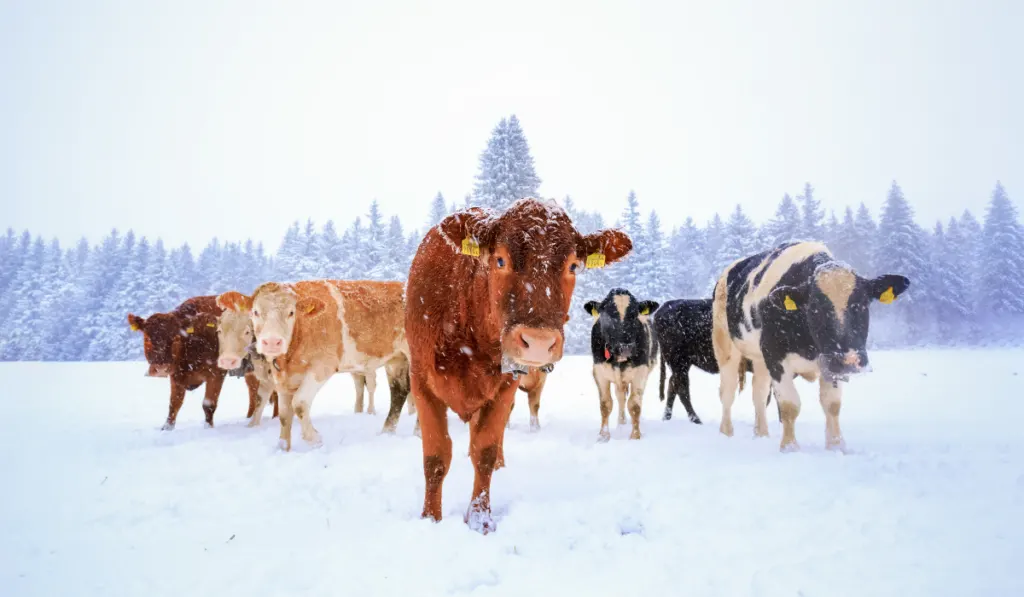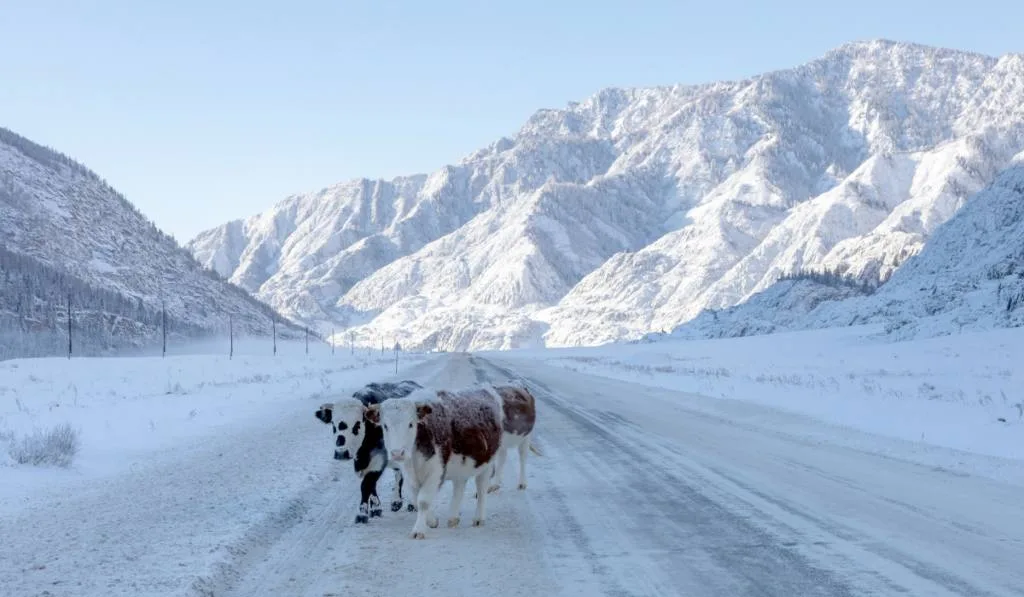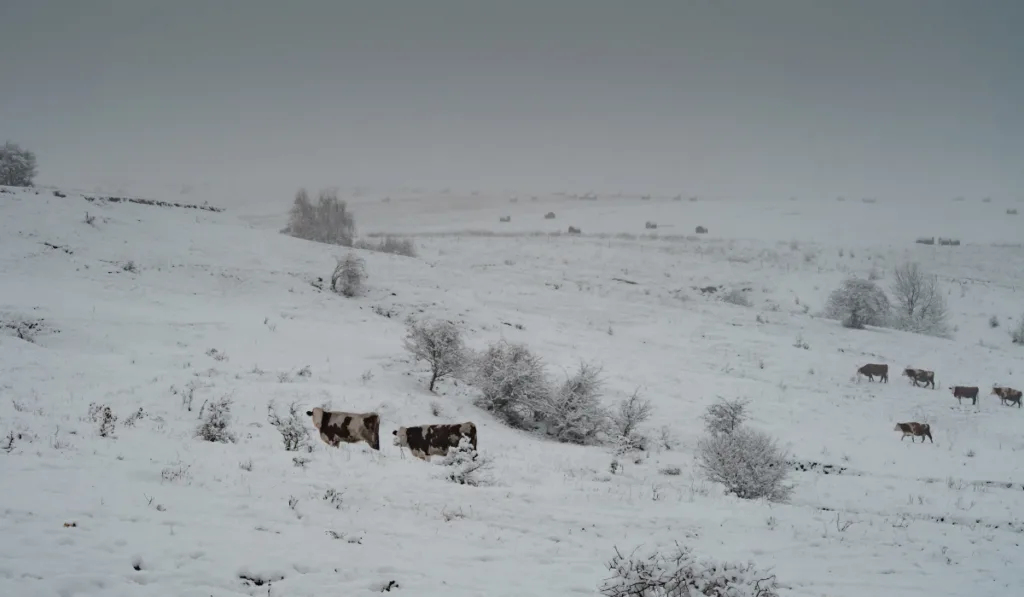Cows are relatively large animals that generally spend most of their days out in open fields or pastures, grazing and enjoying life. They are herd animals but are just as happy to live alone as long as they have good food, clean water, and possibly a warm barn to come home to at the end of the day.
Cows get cold as they are warm-blooded creatures. They need to maintain an average body temperature of around 101 degrees Fahrenheit. If a cow has a heavy winter coat and is in good condition, she can withstand freezing cold temperatures. Shelter should be available for her to escape the elements if she chooses.

Even though cows have layers of insulation and thick winter coats, they can still feel the cold. Extreme fluctuations in temperatures can harm the cows if they are not looked after and provided for. What can we do to keep our cows from getting too cold?
Table of Contents
Why Do Cows Get Cold?
As mentioned earlier, cows, just like humans, are warm-blooded creatures. This means that they must maintain a specific core body temperature of around 101 degrees Fahrenheit (38 degrees Celsius). If their core temperature drops, they will begin to feel the cold.
Both the air temperature and the wind chill factor contribute to how hot or cold the animal is during each season.
How Do Cows Survive The Cold?
Cows will grow an extra thick coat as additional insulation to help combat the effects of the cold. They will also seek shelter from the wind as wind chill affects the cow’s body temperature. They will eat more to increase their fat layer providing another insulating layer for protection from the elements.
As long as they stay dry, they can withstand freezing temperatures while outside. This is possible because they can burn more energy to keep warm by a process known as fermentation which happens in their rumen (one of their four stomachs).
While out in the field or pasture, cows have been known to huddle together in groups to protect each other from the cold or turn away from the cold wind!
Do Some Cows Feel The Cold More Than Others?
Dairy cows are vastly different from beef cows as they do not need to make as much muscle as beef cows as their purpose is to produce volumes of healthy milk.
Dairy cows do not have the extra insulation required for the colder winter months, so they need to be protected and stabled during extreme temperatures.
Beef cows generally live outside all year long so they can better adapt to the weather changes. They have an extra layer of fat and muscle which works great for insulation in the wintertime. They grow a thick winter coat which keeps them warm in cold weather.
Do Cows Like The Cold Weather?
Although cows can function in cold weather, they do not like extreme temperatures and are happier in milder weather. Ideal temperatures for cows are around 25 – 65 degrees Fahrenheit (-3 – 18 degrees Celsius).
Cows enjoy cooler weather as they are large muscular animals with a leather coat that can make them very hot!
In freezing weather, cows can get hypothermia and frostbite if they do not have a place to shelter or are left outside all the time. Hypothermia can cause the animal to lose consciousness and die in extreme cases.
The cowherd or farmer’s job is to check the weather daily and decide when the cows should be let out to pasture or kept in the barn for warmth.
Sometimes nursing mothers can get frostbite on their teats if the temperatures drop while they are nursing and the teats are wet when they go out to pasture.

Can Cows Stand In Cold Weather
One theory is that cows can predict the rain. Cows lie down to conserve energy, so studies suggest that cows can detect the arrival of cold weather and lie down to conserve their energy before the cold arrives.
In hot temperatures, cows stand more to expose more of their surface area, lowering their core body temperature. When cows get too hot, they eat less and produce less milk.
Some cows will stand outside in the freezing cold, rain, and snow, even if they have access to a warm barn or a lean-to! While there are varying tales on why this happens, there does not seem to be any scientific reason for it. The choice, it would seem, is up to the animal!
Perhaps they enjoy the cooler weather, primarily if they have grown a thicker coat for the winter, or maybe they are just too lazy to find shelter! Either way, they seem to move to shelter when they have had enough of the cold and do not seem to suffer any ill effects.
How To Keep Cows Warm
Farmers in regions with milder temperatures don’t have to worry too much about the cold, although they sometimes have a problem with their cows during the rainy season.
Certain regions in the country have been known to experience extreme temperatures when it rains, even though the temperatures should be warmer.
Extreme weather can be harmful to cows, especially dairy cows, as they will not produce as much milk in cold weather.
What Can I Do To Help My Cows Keep Warm?
There are a few ways that you can help to keep your cows happy and safe during the cold winter months.
1. Shelter
While the cow is out in the pasture, any form of shelter, whether man or natural, is valuable to the animal to protect them from the cold chill.
A warm barn should always be available to your cows, with dry, warm hay, fresh grain, and clean water.
2. Food
Increase the amount of food available to each cow. Cater for additional feed while they cannot graze in the pasture and add grain to their diets.
Providing extra food should help them to maintain their body weight throughout winter and not succumb to stress.
If they do not eat enough to meet their additional energy requirements, the cow will lose weight. The more weight they lose, the less insulation they have, the more susceptible they are to stress, and they lose weight faster!
3. Separate The Herd
Sort out the thinner, weaker cows from the herd to a separate area. They may need extra feed and additional nutrients to prepare for the winter months and get them through the cold days.
Pregnant and nursing mothers need additional nutrients to aid with fetal growth and milk production.

Do Cows Suffer From Stress In Cold Weather?
Generally, in mild temperatures, cows do not have to expend any further energy to maintain their body temperature as their metabolic processes provide enough energy to maintain their core heat.
Cows can become stressed during extremely cold temperatures or fluctuations in temperatures, as they need to generate extra energy to maintain their body temperature to increase their metabolic rate to keep them warm.
This is typical for beef cows. Beef cows need to increase their food intake to produce the extra energy they need to warm up.
How To Limit The Effects Of Cold Stress
There are ways that you can protect your cows from the stresses of cold weather and extreme temperatures.
- Check the weather. Be pro-active and be informed. Know when the temperatures are likely to drop.
- Provide shelter from the wind. A barn or a lean-to should be available to the animals always to protect them from the wind.
- Provide dry bedding. A warm, dry place to rest will calm the animals and prevent stress.
- Provide food and water. Ensure the food is dry, add more grain and hay if necessary and check that the water is not frozen. Provide additional food and water to meet the cow’s needs.
- Keep cows clean and dry. Wet and mud-caked coats will make cows more susceptible to cold stress.
Conclusion
Cows can be kept healthy and comfortable during freezing temperatures, but it is up to these animals’ owners to provide what is needed to keep them going throughout the winter.
By planning and pro-actively providing what the animals need, there should be no reason why they cannot survive an icy winter and maintain their body fat to produce the milk and meat required by the farmer homesteader.
